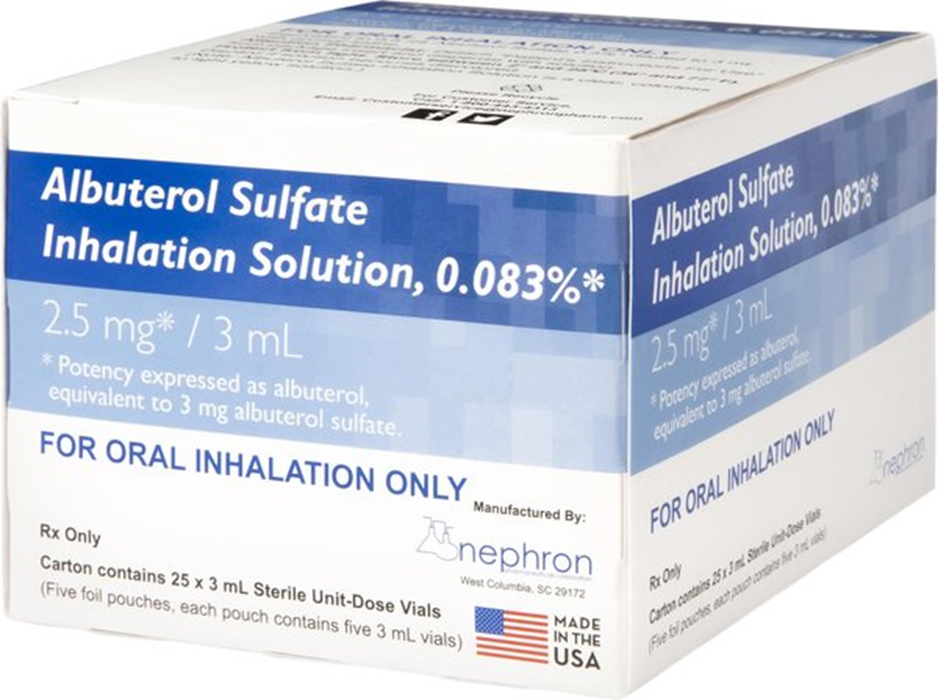A nurse is caring for an 18-month-old toddler in the emergency department. The nurse reviews the toddler's medical record and assessment findings. Which of the following provider prescriptions should the nurse anticipate?
acetaminophen suppository.
oral rehydration solution.
nebulized albuterol.
intravenous antibiotics.
The Correct Answer is C
Choice A reason: Acetaminophen suppository is not a likely prescription, as it is used to reduce fever and pain, which are not the main problems of the toddler. The toddler has a high axillary temperature of 39.5°C (103.1°F), which is not considered a fever in children under 2 years old. The normal axillary temperature range for children is 36.5°C to 37.5°C (97.7°F to 99.5°F).
Choice B reason: Oral rehydration solution is not a probable prescription, as it is used to prevent or treat dehydration caused by diarrhea, vomiting, or excessive sweating, which are not the main problems of the toddler. The toddler has a normal respiratory rate of 22/min and oxygen saturation of 98%, which indicate adequate hydration and oxygenation.
Choice C reason: Nebulized albuterol is a possible prescription, as it is used to treat bronchospasm, which is a common complication of respiratory infections in children. The toddler has a high apical heart rate of 142/min, which may indicate respiratory distress or hypoxia. The toddler is also pulling at his ear, which may indicate an ear infection or pain.

Choice D reason: Intravenous antibiotics are not a likely prescription, as they are used to treat bacterial infections, which are not the main problems of the toddler. The toddler has no signs or symptoms of a bacterial infection, such as purulent discharge, foul odor, or localized inflammation. The toddler may have a viral infection, which does not respond to antibiotics.
Nursing Test Bank
Naxlex Comprehensive Predictor Exams
Related Questions
Correct Answer is A
Explanation
Choice A reason: Your baby will receive a hepatitis B vaccine prior to discharge is correct, as this is the recommended schedule for the first dose of the hepatitis B vaccine for all newborns, regardless of maternal hepatitis B status.
Choice B reason: Your baby will have the first diphtheria, tetanus, pertussis vaccine at the 2 week well-baby visit is incorrect, as this is too early for the first dose of the DTaP vaccine. The first dose of the DTaP vaccine should be given at 2 months of age.
Choice C reason: Your baby should receive the pneumococcal conjugate vaccine on his first birthday is incorrect, as this is too late for the first dose of the PCV13 vaccine. The first dose of the PCV13 vaccine should be given at 2 months of age, followed by three more doses at 4, 6, and 12-15 months of age.
Choice D reason: Your baby should receive the measles, mumps, rubella vaccine at 6 months is incorrect, as this is too early for the first dose of the MMR vaccine. The first dose of the MMR vaccine should be given at 12-15 months of age, followed by a second dose at 4-6 years of age.
Correct Answer is C
Explanation
Choice A reason: This is not a correct instruction for the nurse to include in the teaching plan. The parents should not adjust the length of the straps of the Pavlik harness by themselves, as this may affect the position and stability of the infant's hips. The nurse should instruct the parents to bring the infant to the provider's office regularly for check-ups and adjustments of the harness.
Choice B reason: This is not a correct instruction for the nurse to include in the teaching plan. The parents should not breastfeed the infant while wearing the harness, as this may interfere with the proper alignment and function of the harness. The nurse should instruct the parents to remove the harness before breastfeeding the infant, and to reapply it after feeding.
Choice C reason: This is a correct instruction for the nurse to include in the teaching plan. The parents should place the diaper under the straps of the harness, as this prevents the diaper from interfering with the position and function of the harness. The nurse should instruct the parents to change the diaper frequently and to avoid using bulky or cloth diapers.
Choice D reason: This is not a correct instruction for the nurse to include in the teaching plan. The parents should not remove the harness when bathing the infant, as this may interrupt the treatment and cause complications. The nurse should instruct the parents to sponge bathe the infant while wearing the harness, and to keep the harness clean and dry.
Whether you are a student looking to ace your exams or a practicing nurse seeking to enhance your expertise , our nursing education contents will empower you with the confidence and competence to make a difference in the lives of patients and become a respected leader in the healthcare field.
Visit Naxlex, invest in your future and unlock endless possibilities with our unparalleled nursing education contents today
Report Wrong Answer on the Current Question
Do you disagree with the answer? If yes, what is your expected answer? Explain.
Kindly be descriptive with the issue you are facing.
